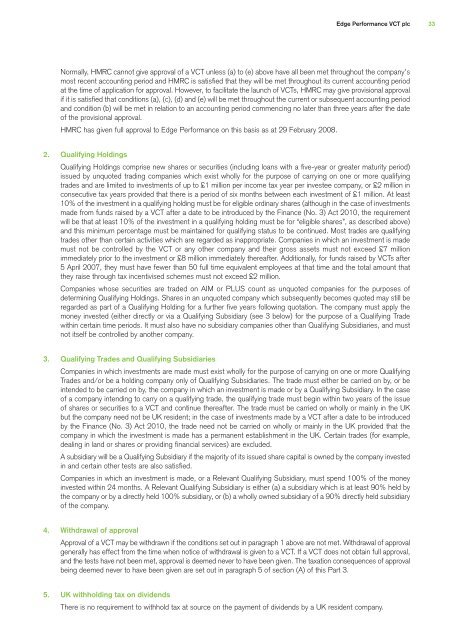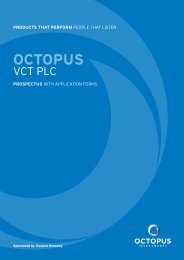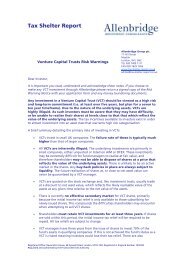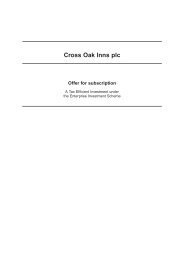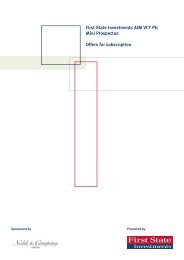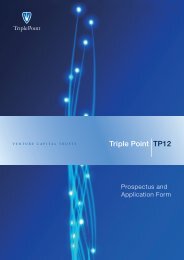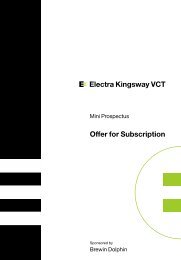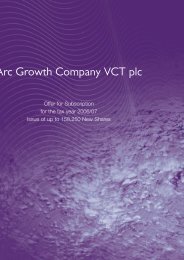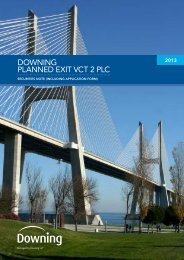EDGE_G_4 12-59-34_Layout 1 - The Tax Shelter Report
EDGE_G_4 12-59-34_Layout 1 - The Tax Shelter Report
EDGE_G_4 12-59-34_Layout 1 - The Tax Shelter Report
Create successful ePaper yourself
Turn your PDF publications into a flip-book with our unique Google optimized e-Paper software.
Edge Performance VCT plc<br />
33<br />
Normally, HMRC cannot give approval of a VCT unless (a) to (e) above have all been met throughout the company’s<br />
most recent accounting period and HMRC is satisfied that they will be met throughout its current accounting period<br />
at the time of application for approval. However, to facilitate the launch of VCTs, HMRC may give provisional approval<br />
if it is satisfied that conditions (a), (c), (d) and (e) will be met throughout the current or subsequent accounting period<br />
and condition (b) will be met in relation to an accounting period commencing no later than three years after the date<br />
of the provisional approval.<br />
HMRC has given full approval to Edge Performance on this basis as at 29 February 2008.<br />
2. Qualifying Holdings<br />
Qualifying Holdings comprise new shares or securities (including loans with a five-year or greater maturity period)<br />
issued by unquoted trading companies which exist wholly for the purpose of carrying on one or more qualifying<br />
trades and are limited to investments of up to £1 million per income tax year per investee company, or £2 million in<br />
consecutive tax years provided that there is a period of six months between each investment of £1 million. At least<br />
10% of the investment in a qualifying holding must be for eligible ordinary shares (although in the case of investments<br />
made from funds raised by a VCT after a date to be introduced by the Finance (No. 3) Act 2010, the requirement<br />
will be that at least 10% of the investment in a qualifying holding must be for “eligible shares”, as described above)<br />
and this minimum percentage must be maintained for qualifying status to be continued. Most trades are qualifying<br />
trades other than certain activities which are regarded as inappropriate. Companies in which an investment is made<br />
must not be controlled by the VCT or any other company and their gross assets must not exceed £7 million<br />
immediately prior to the investment or £8 million immediately thereafter. Additionally, for funds raised by VCTs after<br />
5 April 2007, they must have fewer than 50 full time equivalent employees at that time and the total amount that<br />
they raise through tax incentivised schemes must not exceed £2 million.<br />
Companies whose securities are traded on AIM or PLUS count as unquoted companies for the purposes of<br />
determining Qualifying Holdings. Shares in an unquoted company which subsequently becomes quoted may still be<br />
regarded as part of a Qualifying Holding for a further five years following quotation. <strong>The</strong> company must apply the<br />
money invested (either directly or via a Qualifying Subsidiary (see 3 below) for the purpose of a Qualifying Trade<br />
within certain time periods. It must also have no subsidiary companies other than Qualifying Subsidiaries, and must<br />
not itself be controlled by another company.<br />
I:10.4<br />
3. Qualifying Trades and Qualifying Subsidiaries<br />
Companies in which investments are made must exist wholly for the purpose of carrying on one or more Qualifying<br />
Trades and/or be a holding company only of Qualifying Subsidiaries. <strong>The</strong> trade must either be carried on by, or be<br />
intended to be carried on by, the company in which an investment is made or by a Qualifying Subsidiary. In the case<br />
of a company intending to carry on a qualifying trade, the qualifying trade must begin within two years of the issue<br />
of shares or securities to a VCT and continue thereafter. <strong>The</strong> trade must be carried on wholly or mainly in the UK<br />
but the company need not be UK resident; in the case of investments made by a VCT after a date to be introduced<br />
by the Finance (No. 3) Act 2010, the trade need not be carried on wholly or mainly in the UK provided that the<br />
company in which the investment is made has a permanent establishment in the UK. Certain trades (for example,<br />
dealing in land or shares or providing financial services) are excluded.<br />
A subsidiary will be a Qualifying Subsidiary if the majority of its issued share capital is owned by the company invested<br />
in and certain other tests are also satisfied.<br />
Companies in which an investment is made, or a Relevant Qualifying Subsidiary, must spend 100% of the money<br />
invested within 24 months. A Relevant Qualifying Subsidiary is either (a) a subsidiary which is at least 90% held by<br />
the company or by a directly held 100% subsidiary, or (b) a wholly owned subsidiary of a 90% directly held subsidiary<br />
of the company.<br />
4. Withdrawal of approval<br />
Approval of a VCT may be withdrawn if the conditions set out in paragraph 1 above are not met. Withdrawal of approval<br />
generally has effect from the time when notice of withdrawal is given to a VCT. If a VCT does not obtain full approval,<br />
and the tests have not been met, approval is deemed never to have been given. <strong>The</strong> taxation consequences of approval<br />
being deemed never to have been given are set out in paragraph 5 of section (A) of this Part 3.<br />
5. UK withholding tax on dividends<br />
<strong>The</strong>re is no requirement to withhold tax at source on the payment of dividends by a UK resident company.<br />
III:4.11


